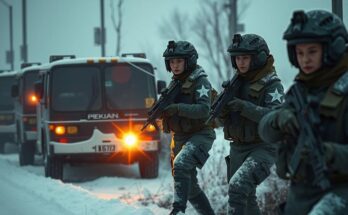Turkey’s airstrikes in Kurdish regions in Syria and Iraq are a retaliation for an attack on a defense firm in Ankara that resulted in four deaths and multiple injuries. The SDF reported 12 fatalities, including two children, and 25 injuries due to the strikes, which targeted alleged PKK sites. General Mazlum Abdi condemned the attacks as indiscriminate, while ongoing tensions remain amidst potential dialogue with imprisoned PKK leader Abdullah Ocalan.
Turkey executed airstrikes late Wednesday targeting Kurdish-controlled regions in Syria and Iraq, as a response to a recent fatal assault on a state-defense corporation in Ankara that resulted in the deaths of four individuals and injuries to over a dozen more. The Turkish government, under the leadership of President Recep Tayyip Erdogan, has attributed blame for this attack to the Kurdistan Workers’ Party (PKK), with Erdogan categorizing it as a “nefarious” deed against the Turkish Aerospace Industries headquarters, located near Ankara. Verified video footage showed damage inflicted upon electrical facilities in towns such as Kobani and Qamishli, which serve as the administrative capital of the predominantly Kurdish governance in northeast Syria. Following these events, the Syrian Democratic Forces (SDF)—a crucial ally of the United States during the campaign against ISIS—reported the death of 12 individuals, including two children, and 25 additional injuries as a result of extensive Turkish air and artillery strikes. The Turkish defense ministry asserted that these operations targeted 47 “terrorist sites” within Syrian and Iraqi territory. General Mazlum Abdi, the commander of the SDF, denounced the Turkish strikes for their indiscriminative nature, asserting that they impacted civilian facilities such as healthcare centers in the northeast part of Syria. He emphasized, “We have repeatedly shown our readiness for dialogue. Meanwhile, we affirm that our forces are ready to defend our people and land,” in a statement posted on social media. Despite the escalating tensions, approximately 900 U.S. personnel continue to operate in the region as part of the international coalition dedicated to combating ISIS. The SDF remains the primary partner for the United States in northeastern Syria. By Thursday morning, neither the U.S. Defense Department nor the Central Command had issued statements regarding the assault in Ankara or Turkey’s subsequent retaliatory actions. The Turkish government views the U.S.-backed SDF and its corresponding civilian organization, the YPG, as directly linked to the PKK, an entity that has conducted a prolonged insurgency against Turkey for decades. The PKK has been officially designated as a terrorist organization by both Turkey and the United States and is chiefly based in the Qandil mountains of northern Iraq, which frequently faces Turkish military operations. The identity of those responsible for the attack in Ankara remains unverified; however, this incident occurs amidst renewed dialogue efforts between the Turkish administration and Abdullah Ocalan, the imprisoned leader of the PKK, whose imprisonment has spanned over 20 years. In a significant development, Ocalan’s nephew, Omer—currently serving in the Turkish parliament—relayed a message implying Ocalan’s openness to resolving the violent conflict, which has endured since the 1980s. Furthermore, the Nationalist Movement Party leader, Devlet Bahceli, has extended an invitation for Ocalan to address parliament, suggesting that Ocalan could be eligible for parole contingent upon the disbandment of the PKK.
The conflict between Turkey and the PKK has persisted for decades, with the PKK seeking greater autonomy and rights for Kurdish people in Turkey. Ankara’s responses frequently involve military action against PKK positions in Iraq and Syria, particularly where the U.S.-backed SDF operates. The dynamics are complicated by the ongoing U.S. presence in the region aimed at combating ISIS, requiring a careful balancing act between maintaining alliances with local forces like the SDF and managing Turkey’s security concerns.
In summary, Turkey’s military response to the attack on its defense corporation highlights the ongoing tensions in the region, particularly regarding the Kurdish forces. The SDF has reported significant civilian casualties and damage to infrastructure, raising concerns about the impact of such military actions. As the situation evolves, particularly with the potential for dialogue emanating from PKK leadership, the future of Turkish-Kurdish relations remains uncertain.
Original Source: www.cbsnews.com




